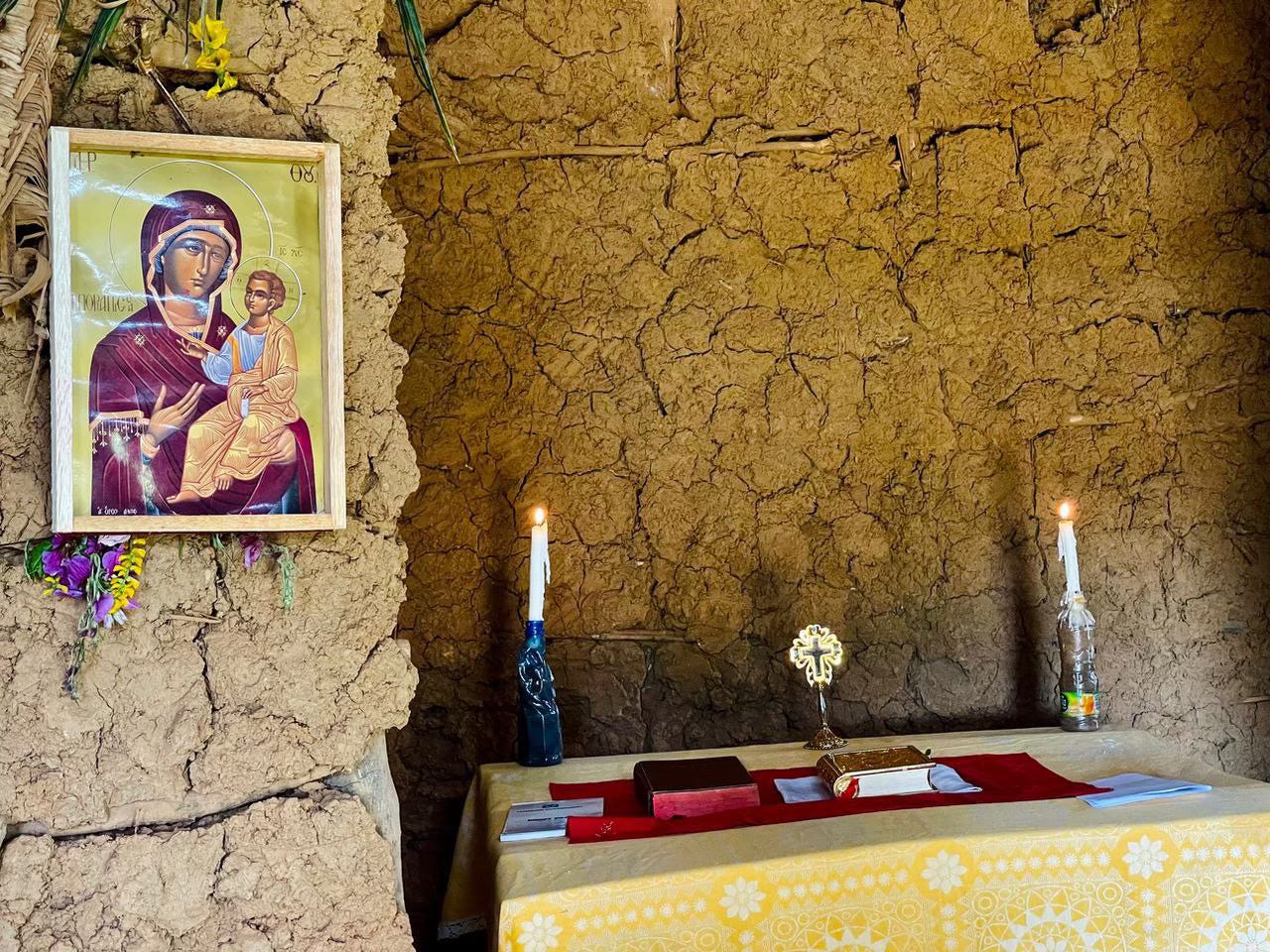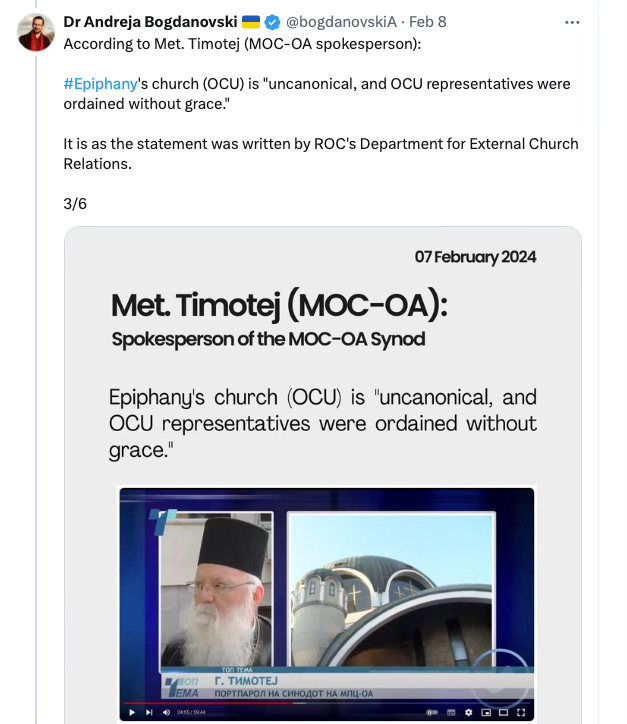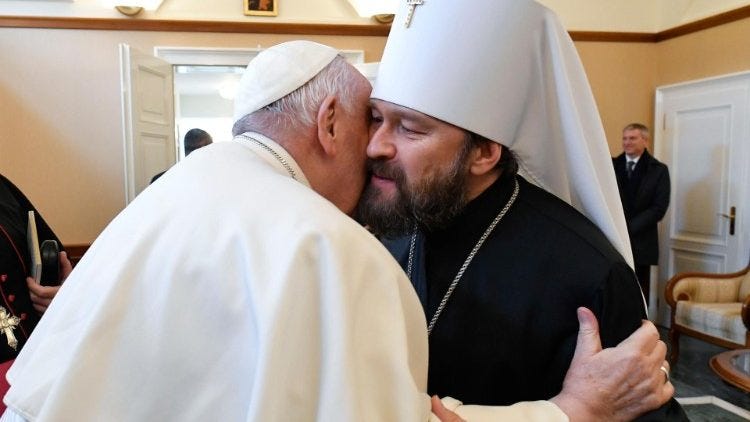Divine Diplo #5: Sweden Stops Russian Orthodox Funding; ROC's Africa Commitment Holds; Macedonian Church Reconsiders; Kirill-Francis Clash
Hello, everyone! Thank you for choosing to follow Divine Diplomacy. I would like to extend a warm welcome to any new subscribers. My name is Andreja Bogdanovski, and I specialise in Orthodox Church politics.
For this week's Ortho-politics round-up, I’ve compiled four stories that show how fast-paced and diverse Orthodox politics can be.
Before we delve into this week's stories, it's worth noting the remarkable resilience of the Russian Orthodox Church as a geopolitical player. Despite the war in Ukraine directly affecting its core operations, it can still project influence across vast distances.
Sweden Halts Funding for Russian Orthodox Church Amid Security Concerns
ROC Remains Committed to Africa Despite The War in Ukraine
Macedonian Orthodox Church Reconsidering Stance on Ukraine's Church Autocephaly
Russian Orthodox Church Clashes with Pope Francis
Not in the mood for reading? Tune in to the narrated version of the newsletter instead.
Sweden Halts Funding for Russian Orthodox Church Amid Security Concerns

The Swedish government has decided to stop the funding for the Russian Orthodox Church outpost operating in Sweden amid fears that this church has been used for espionage. The decision affects the state aid grants available to religious and faith communities in Sweden for 2024.
The Swedish Agency for Support for Faith Communities, which is a government agency that (among other things) provides state aid to religious communities, stated that it would stop the funding available for the ROC (which in Sweden operates under the name Moscow Patriarchate- Moskvapatriarkatet). It concluded that ROC in Sweden does not contribute to the strengthening of Sweden’s social fabric and is not compatible with the country’s democratic standards and practices. In 2022, the church received around 18000 EUR from the Swedish state.
According to the agency’s press release, following the Russian invasion of Ukraine and the prominent role of the Russian Orthodox Church in sanctifying the war, the agency has engaged in dialogue with the ROC representatives in the country to assess their position on the war in Ukraine. The Swedish Agency for Support for Faith Communities reported that ROC representatives it talked to did not support the war in Ukraine.
The agency, however, requested a separate assessment by the Swedish security service (known as Sapo), which proved to be alarming. Sapo has said that it believed that the Moscow Patriarchate has been used "as a platform for gathering intelligence and other security-threatening activities." The Swedish security agency has stated that the Moscow Patriarchate representatives have been in contact with “persons who work for the Russian security and intelligence”, adding that the church has also been a beneficiary of repeated “significant funding from the Russian state”.
As a result of Sapo’s assessment, the Swedish Agency for Support for Faith Communities made the Moscow Patriarchate ineligible for state funding.
The ROC Remains Committed to Africa Despite the War in Ukraine
The Holy Synod of the Patriarchate of Alexandria had decided to depose the Russian Bishop Constantine (Ostrovsky) of Zaraysk. It convened a meeting on 16 February 2024 under the chairmanship of the primate of the church Met. Theodore to discuss the newly appointed Russian bishop after he was assigned to this position by the Russian Orthodox Church in October 2023. Ostrovsky is serving as an acting head of the Russian Orthodox Church exarchate in Africa, replacing Met. Leonid (Gorbacev) who was appointed to the Yerevan-Armenian diocese.
The Holy Synod's decision to defrock the Russian Bishop results from the “uncanonical intervention of the Church of Russia into the spiritual and pastoral jurisdiction of the Patriarchate of Alexandria on the continent of Africa.” The synod had accused Ostrovsky of several canonical offences, including intervention in the jurisdiction of another local church and bribery of clergy.
The decision to defrock the Russian bishop comes as a result of the tense relationship between the ROC and the Patriarchate of Alexandria that became grim after the latter recognised the autocephaly of the Orthodox Church of Ukraine in November 2019. This angered Moscow, which launched its own campaign against the Patriarchate of Alexandria by establishing its own exarchate in violation of canonical principles. The Patriarchate of Alexandria, stretching to the entire continent of Africa, considers itself as the truly legitimate Orthodox church representative. It calls the Russian Orthodox Church's expansionist politics an illegal and illegitimate intervention in its own canonical jurisdiction.
I’ve written about the Patriarchate of Alexandria's recognition of the Orthodox Church of Ukraine for Orthodoxy in Dialogue before.
Macedonian Orthodox Church Reconsidering Stance on Ukraine's Church Autocephaly
In an unusually fast change of direction, the Macedonian Orthodox Church (Ohrid Archbishopric) has formed a commission that is tasked to examine the Ukrainian autocephaly question. This was reported by Religija.mk, North Macedonia’s biggest news portal covering religious affairs.
This U-turn approach comes shortly after Met. Timotej, who is in charge of public relations, commented that MOC (OA’s) unwillingness to recognise Ukrainian autocephaly remains the biggest obstacle for the MOC (OA’s) own autocephaly hopes as it awaits a Tomos of autocephaly from the Ecumenical Patriarch. In 2022, Bartholomew healed the Macedonian schism and returned the MOC (OA) into regularity after fifty years of isolation. Shortly after, the Serbian Orthodox Church issued its own Tomos of autocephaly that has been recognised by a handful of churches, including the Russian Orthodox Church.
At the beginning of February, Met. Timotej stated that for the MOC (OA), Epifaniy’s church is "uncanonical, and OCU representatives were ordained without grace.” The wording and essence of this statement closely follow the ROC's handling of the issue, as Moscow remains the biggest opposing force to OCU’s independence in the Orthodox world.
Metropolitan Hilarion of Bregalnica will chair the MOC (OA) commission. According to the church’s Holy Synod, the newly formed commission would analyse “the status of the Orthodox Church of Ukraine.”
Apart from looking into the Ukrainian autocephaly, the same commission is also tasked to “analyse the problem over the naming of the MOC (OA) by the Greek-speaking churches”.
Russian Orthodox Church Clashes with Pope Francis
Three months after the “Fiducia supplicans” declaration, which allows Catholic priests to offer blessings to unmarried couples, including same-sex couples, the Russian Orthodox Church is getting seriously involved in the debate.
The document issued by the Vatican received a mixed reception and heated discussions. Some in the Catholic church, particularly the African bishops, were disappointed with Pope Francis.
Despite being absorbed in Putin’s war, Metropolitan Hilarion, the former chairman of ROC’s Department for External Church Relations, led a Synodal Biblical-Theological Commission that examined the declaration. It concluded that the document was a “sharp departure from Christian moral teaching.”
Three months later, and with much international attention, the “Fiducia supplicans” effect had reached Moscow. Met. Hilarion justifies the reason for ROC engaging on the matter because they felt obliged to form an opinion due to their relationship with the Vatican: “[W]e have a dialogue with the Catholic Church, an interaction. And we felt it is our duty to respond to such a radical innovation.” According to him, the declaration “elicited an unequivocally very negative reaction from our commission. We were unanimous that this document reflects a very serious departure from Christian moral norms.”
The ROC's decision to engage with such a highly sensitive topic is not coincidental. In a similar manner, the ROC keeps attacking the steps taken by the Greek state to allow same-sex marriage (February 2024). Several high-ranking ROC representatives have characterised the move by the Greek lawmakers as an attack on the traditional family and values. The Deputy Chairman of the DECR, Igor Yakimchuk, characterised it as “a tragic event both for the Greek people and the Church of Greece.” He also attacked the Church of Greece: “Despite its state status, the Church was unable to unite its flock to prevent this blatant violation of traditional moral principles.”
The ROC’s strategy at play is evident with the attacks on the Vatican and Greece. These serve to cement and promote Putin’s Russia as a bastion of conservatism, where the teachings of the Russian Orthodox Church are propped as the highest moral authority. ROC is exploiting the polarisation around Pope Francis’s stance on the issue of same-sex blessings as well as the Greek church's inability to affect the passing of same-sex marriage legislation to strengthen its image as the guardian of traditional Christian morality.
Thank you for reading this far. Please feel free to share and forward this newsletter with your colleagues and friends. If you want to support my work, please consider subscribing as a paid member.
Your support is appreciated!
Andreja Bogdanovski
For a more extended analysis, check out last week’s main piece examining what has changed for the Ukrainian Orthodox after two years of war.






